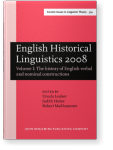Prevent and the battle of the -ing clauses
Semantic divergence?
The article discusses the variation between the two most common sentential complements of the verb prevent, as in prevent me from going and prevent me going, from a semantic point of view. The variant me going became significantly more common in British English in the twentieth century, competing with the variant with from. Mair (2002) has suggested that a similar phenomenon may be incipient with semantically similar verbs like hinder and stop, signalling a more general grammatical change that is restricted to British English. With data from the British National Corpus, the article proposes a semantic distinction, a consequence of the recent competition, in order to partially explain the variation. The distinction links the notion of hypotheticality to the -ing clause in the prepositional variant, whereas the -ing clause without from expresses a realized event, or an existing property of the object NP of prevent.
Cited by (1)
Cited by one other publication
Rudanko, Juhani & Paul Rickman
2022.
Analyzing the Gerundial Patterns of prevent: New Corpus Evidence from Recent English.
Canadian Journal of Linguistics/Revue canadienne de linguistique 67:1-2
► pp. 71 ff.

This list is based on CrossRef data as of 20 july 2024. Please note that it may not be complete. Sources presented here have been supplied by the respective publishers.
Any errors therein should be reported to them.
